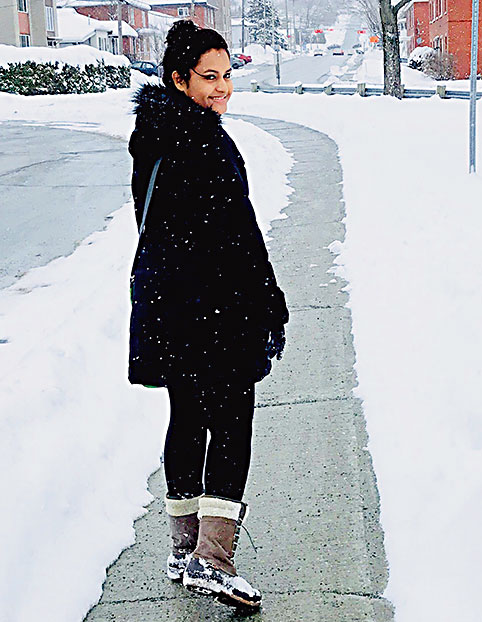Life is not easy for students who go abroad to study. It is not just a college that you have to learn to navigate but also a new country and a different society. If you keep an open mind, however, you'll soon be able to get used to the new normal. Here are a few tips from students who have already walked that path.

Surviving winter
Born and brought up in Durgapur, where summer temperatures hover around 45° Celsius, Rachita Chatterjee landed in the Canadian city of Quebec in peak winter, to join Sherbrooke College. "The temperature was sometimes below -30°C," reminisces doctoral student Rachita. She spent the winter in a university residence, adjusting to the weather. Once summer came around, she shifted to an apartment off-campus, where she can cook and hang out with friends. "Also, it is easier to visit supermarkets, which are nearby," she says. She is now looking forward to next winter.
For Mumbai lad Trishit Banerjee, on the other hand, the weather at Tohoku University in Sendai, Japan, was a pleasant surprise. The undergraduate student of molecular chemistry had grown up with only two seasons, summer and monsoon. In Sendai, "you can easily notice the four different seasons. I enjoy the cool and pleasant weather. Even summer is so nice here," he says.
Basic etiquette

When you move to a different country, you feel like an outsider for a while. There are anxieties about new traffic rules, the subway system and etiquette. The story of Howrah boy Abhinit Nagar, who went to do doctoral research in immunology at Albany Medical College in New York, US, three years ago, was the same. "This world was different, its people were different and so was their culture. At certain times, I felt this change was welcome while at others it seemed too distant and cold," he says.
But he was quick to adapt. He says, "I was out for my morning jog and a fellow jogger, whom I had never met before, wished me good morning. This was not the only time a stranger greeted me. It became a routine, be it in the park, walking to school or standing in queue at Starbucks. The fact that people acknowledged my presence made me comfortable." He saw people holding doors for others, even if they were in a hurry to go home on a Friday. "One day, I saw an old man holding the door for me when I was at least 5-6 feet away," he recalls. These experiences taught him to show the same respect to others.
Food and culture

Adjusting to Japanese food was not easy for Trishit. "It lacks herbs and spices and has a lot of sea food. Compared to Indian cuisine it is bland, though extremely healthy. Also, the raw fish in sushi was a bit of shock initially," he says.
But a bigger culture shock was when he visited an onsen, or public bath, where people bathe nude in a giant outdoor pool. After three years in Japan, "I am now absolutely fine with it," says Trishit. He has learnt to value the Japanese, who are strongly rooted to their culture.
Rachita, too, had a few initial problems adjusting to the Francophone culture in Quebec, which is quite different from what she had experienced in India and in Britian, where she got her master's degree from the University of Nottingham. "I quickly picked up the French language and learnt the basics of French manners so that I could adjust to and integrate with the locals," she says.
Abhinit took much longer to adjust. " It took me almost a semester to familiarise myself with the US culture that seemed so alien at first. The weather, too, was quite extreme and it took me time to adjust to it. The other issue I had was with managing time - I sucked at it. As a result, my first semester grades were pretty dismal."
His new friend Josh was a great help. "He helped me understand this culture. At our orientation we were told to ask if something is new or offensive to us to avoid unintentional harassment. So I started talking to people about anything new that I saw," Abhinit says.
"Be friendly and courteous towards people," advises Rachita. "There are many good things to learn and appreciate in a new country, find them."
Try finding things you like - such as an offbeat hobby, new friends - or places that you feel comfortable in, such as a cosy coffee shop. By surrounding yourself with such things, you will forget that you are in a foreign country.










